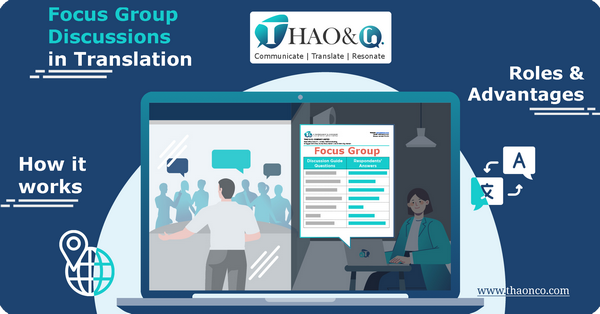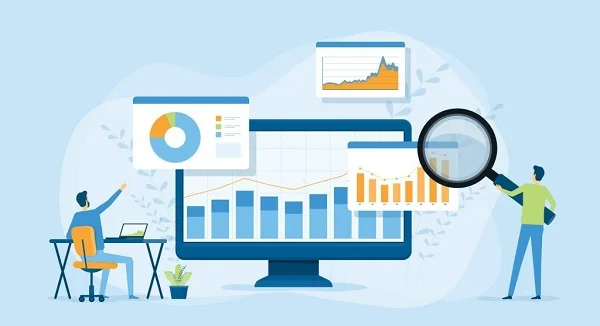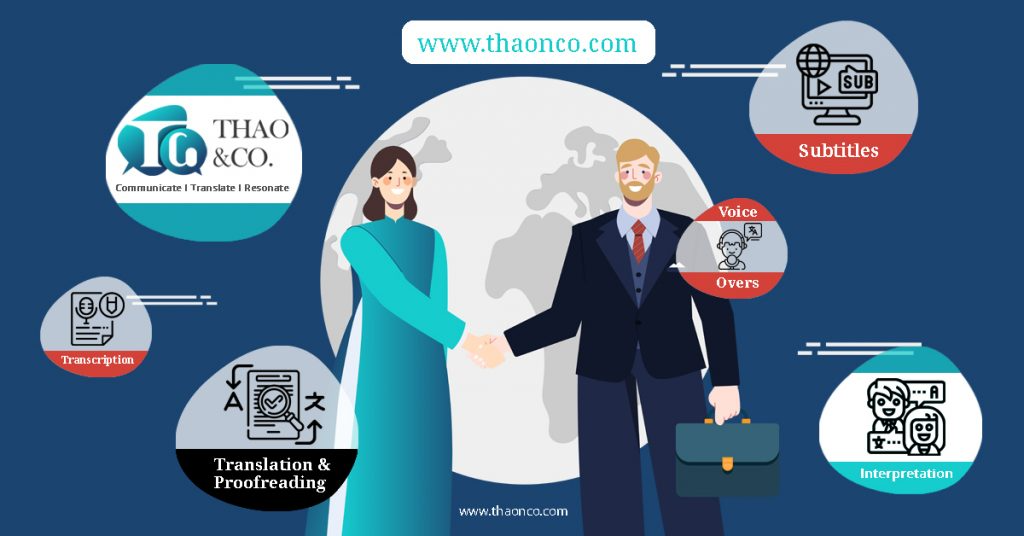What benefits do Focus Group Discussions bring to translation? The significance of market research in translation cannot be overstated, as it plays a pivotal role in guaranteeing both linguistic precision and contextual appropriateness, aligning seamlessly with consumer expectations. In this article, Thao & Co. will provide you with comprehensive information on the role of market research and the advantages of employing the Focus Group Discussions method during the translation process.
Focus Group Discussions (FGDs) refer to a market research method used to gather opinions and perspectives from a specific group of respondents on a particular topic. Instead of conducting research on each individual, FGDs create a dynamic interactive environment where group participants can share their opinions, discuss, and exchange ideas with each other.
FGDs are often used when you want to collect complex and multidimensional information from diverse sources. To organize an effective Focus Group Discussion, it is advisable to understand the following basic requirements:

As a leading company in the field of creative translation, Thao & Co. recognizes the significant influence that language has on purchasing behavior and the interactions between consumers and brands. In our Consumer Language Research© service, we leverage Focus Group Discussions to systematically gather and analyze data. This approach empowers us to deliver top-tier translations to businesses, utilizing the language of consumers to foster trust and cultivate positive interactions with their brands.
Consumer Language Research is an important step for successful translation that meets the expectations of target customers. This is an effective method to gain a deep understanding of customers, thereby enabling the development of a potent marketing strategy for businesses.
Consumer language research is the secret key to translation, forging a vital connection between the brand and the customer. This process is an important step in unraveling the language of the target customers, delving into their desires, and identifying their potential values. By accessing vital market information, we can fine-tune content to craft translations that not only break new ground but also evoke emotions and foster a strong connection with customers.
Consumer language research not only supports translation professionals in understanding the target customers but also helps businesses identify the right content marketing strategy. Thoroughly researching the market, consumer behavior, and emerging trends empowers businesses to formulate smart marketing strategies and employ the most effective approaches to attract and engage their target customers.
Furthermore, consumer language research serves as a means to mitigate risks and facilitate the highest quality translations. Analyzing and evaluating potential risks such as cultural misunderstandings or translation pitfalls ensures that the translation process can guarantee accuracy and faithfully convey the intended meaning. This results in highly precise and appealing translations, contributing to building customer trust and loyalty.
Focus Group Discussions help explore the psychology of target customers, often yielding fresh and innovative ideas. This is an effective tool for developing a thorough understanding and creativity in the translation process. By leveraging these outstanding advantages, Thao & Co. incorporates Focus Group Discussions in Consumer Language Research© service to elevate the quality of our creative translations.
Focus Group Discussions create a lively and diverse dialogue that helps collect high-quality data. This research method is a perfect combination of interaction and exploration to understand the diversity of opinions and perspectives of customers.
In Focus Group Discussions, each participant expresses different viewpoints, experiences, and personalities, all interwoven in a dynamic conversation. Interactive discussions foster an open-minded environment where new ideas can form and develop.
Focus Group Discussions not only gather diverse perspectives but also delve into the intricate layers of human insights, exploring their depth and complexity. This helps businesses gain a deeper understanding of individual viewpoints, values, and experiences. From there, they can paint a clearer picture of relationships, interactions, and motivations that influence consumer decisions.
One of the greatest advantages of Focus Group Discussions is streamlining the implementation process and optimizing performance. Instead of conducting many individual interviews, a Focus Group Discussion collects information from multiple responses in one go, thus saving time and amplifying the overall efficiency of the research process.
Focus Group Discussions also help save costs significantly. Instead of traveling and organizing multiple interviews, businesses can conduct discussions in one place, reducing personnel and meeting room expenses. This helps alleviate financial burdens and opens up opportunities for development and innovation.

The Focus Group Discussion process in Consumer Language Research© at Thao & Co. is divided into three steps, each playing a crucial role in conducting a successful Focus Group Discussion.
This is the preliminary step for the Focus Group Discussion, involving these important tasks:
This step focuses on conducting the focus group discussion with the following tasks:
This step is for exploring and analyzing the information gathered from the Focus Group Discussion, including:
Through the use of Focus Group Discussions, participants can enjoy a more engaging and interactive experience, which in turn facilitates the collection of diverse opinions and valuable information.
Typically, during the span of the project, we conduct two rounds of discussions: one prior to the translation process and another after the translation has been completed. This helps ensure accuracy and compliance with the translation requirements. Additionally, it creates opportunities for refining the translation and meeting the expectations of the target audience.
The initial discussion takes place prior to starting the translation process. Its purpose is to gather information regarding both common phrases and specialized terminology, as well as key expressions in the respective field of the source text.
Based on this information, the translation team can build a keyword glossary for essential terms and vocabulary for the translation. The keyword glossary is a valuable resource for the translation process, ensuring accuracy and consistency in translation.
Beyond the keyword glossary, the outcomes of the pre-translation discussion enable professional translators to acquire a comprehensive understanding of the context, translation objectives, and the intended target audience. This, in turn, empowers them to tailor their expressions and employ suitable language, thereby enhancing the comprehensibility and resonance of the translation with the readers.
The second discussion takes place following the completion of the translation process. Its primary objective is to gather feedback on the translated material. The results of the second discussion provide insights into the perceptions, evaluations, and opinions of consumers regarding the translations.
During the second discussion, respondents take into account factors such as accuracy, impact, expression, and contextual appropriateness to offer evaluations and comments on each translation. This helps determine the effectiveness of the translation and offers valuable insights for selecting the most suitable rendition.

At Thao & Co. Translation Agency, we take pride in our position as a leading company within the translation industry, providing an unmatched Consumer Language Research© service. Our services are the result of meticulous development rooted in thorough market research. Thao & Co. employs advanced market research methods to gather insights from consumers, gaining a deep understanding of their translation needs, expectations, and feedback.
We are committed to delivering high-quality creative translations supported by robust market research, empowering clients to navigate today’s dynamic and diverse markets with success. For additional information, please reach out to us through our Get a Quote page to schedule a free consultation.